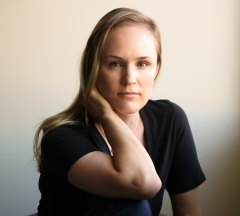Highlighting Faculty Member Kate Wassum
moattari
Date published: 09/24/20
Dr. Wassum’s research is focused on understanding the neural correlates underlying motivation and decision making and how this information can be harnessed to understand and treat mental illness and substance use disorder.

To make good decisions we have to get into the time machine that is our brain and cast ourselves into the future to consider the potential outcomes and consequences of our behavior. That time machine is programmed by our memories. What has happened in the past influences what you think will happen in the future. The Wassum lab has been working to understand how memories, in particular of rewarding events, are formed and stored in the brain and how they combine with one’s current state to influence motivation and decision making. The ultimate goal is to facilitate the understanding and treatment of the mental illnesses, such as substance use disorder, that arise from disruptions in the neural systems supporting reward memory and decision making.
The Wassum lab takes a multidisciplinary approach to their research, combining behavioral procedures rooted in the rich traditions of learning theory with advanced neural recording, interference, and/or molecular methods. They collaborate heavily to achieve their goals.
Dr. Wassum has made a number of important discoveries. In one line of work, Dr. Wassum’s lab has revealed the neural circuits important for learning about and retrieving the value of rewarding events. In another line of work, Dr. Wassum’s lab has discovered a critical neurochemical interaction in the brain that allows reward-predictive cues to motivate reward-seeking behavior when this is adaptive. In a third line of work, Dr. Wassum’s lab is revealing the neural substrates that allow habits to form and is investigating how these systems can be hijacked to promote maladaptive habits.
In addition to her research, Dr. Wassum is also a senior editor at eLife Sciences and a reviewing editor at the Journal of Neuroscience. She is also dedicated to improving diversity, equity, and inclusion in STEM fields.
Dr. Wassum was born and raised in North Carolina. After getting her undergraduate degree from UNC Chapel Hill, she came to UCLA to pursue her doctoral degree in Neuroscience. Kate continued at UCLA for her postdoctoral work before joining the UCLA Psychology faculty in 2011. In her free time, Dr. Wassum enjoys spending time with her family, hiking, and wine.
More about her research and lab can be found at wassumlab.psych.ucla.edu or on Twitter @KateWassum
Categories: Spotlight
